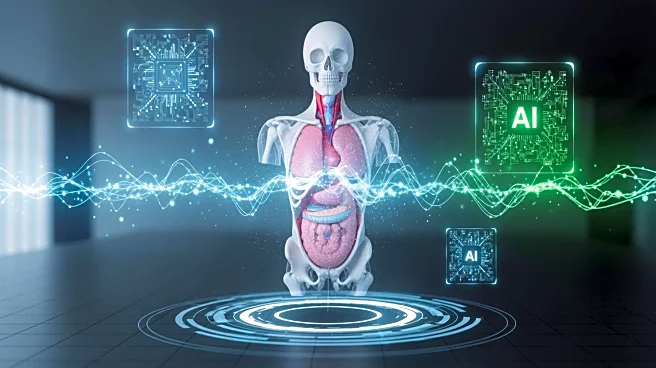What's Happening?
A recent study evaluated the performance of four large language models (LLMs) in answering multiple-choice questions related to anatomy. The models tested were GPT-4o, Claude 3.5 Sonnet, Gemini 1.5 Flash, and Copilot, compared against the previous version,
ChatGPT-3.5. The study found that the current LLMs significantly outperformed ChatGPT-3.5, with GPT-4o achieving the highest accuracy at 92.9%. The research highlighted variations in performance across different anatomical topics, with Head & Neck and Abdomen being the best-performing categories. The study also noted that some high-level critical-thinking questions remained challenging for all models.
Why It's Important?
The findings underscore the rapid advancements in AI technology, particularly in educational applications. Improved accuracy in AI models can enhance learning experiences and outcomes in medical education, potentially leading to better-trained healthcare professionals. The study's results may influence the integration of AI tools in academic settings, offering more reliable and efficient educational resources. Stakeholders in the education and healthcare sectors stand to benefit from these advancements, as they promise more effective teaching methodologies and improved student comprehension.
What's Next?
The study suggests further exploration into refining AI models to tackle high-level critical-thinking questions, which remain a challenge. As AI continues to evolve, educational institutions may increasingly adopt these technologies, prompting discussions on curriculum integration and the role of AI in teaching. Future research could focus on expanding the scope of AI applications in other educational fields, assessing their impact on learning outcomes and student engagement.
Beyond the Headlines
The study raises ethical considerations regarding the reliance on AI for educational purposes. As AI models become more prevalent, questions about data privacy, the potential for bias, and the need for human oversight in educational settings become increasingly relevant. Long-term, the integration of AI in education could shift traditional teaching paradigms, necessitating new strategies for educators to effectively incorporate technology into their teaching practices.















